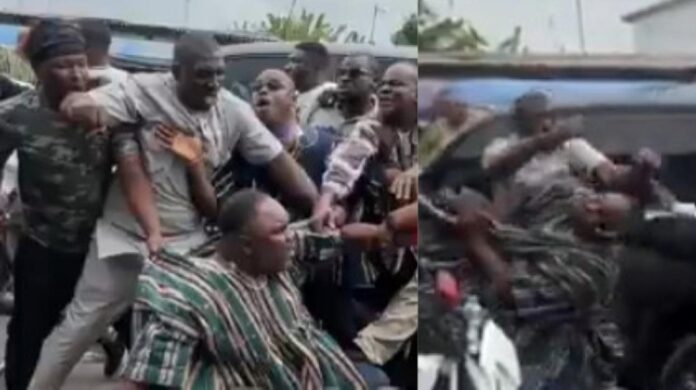As the dust settles on the violence that marred the Ablekuma North rerun, a piercing question lingers: Can Ghana truly safeguard its journalists while defending the fragile pillars of democracy? What began as an electoral rerun quickly spiraled into scenes of chaos—echoes that now threaten not only voter confidence but the very guardians of truth.
In an era where information is power and press freedom defines democratic health, the recent turbulence is more than political—it’s a warning flare.
Journalism on Trial
Ghana has long prided itself on its press freedom ranking, often cited as a democratic beacon in West Africa. But the Ablekuma North incident is the latest echo of a louder, disquieting pattern—where journalists covering elections face intimidation, physical harm, and, in some cases, censorship by silence.
I was shaken to the core when I saw a police officer alleged to be a commander slap a fellow colleague, a journalist. I was not on the grounds of the incident but the sight of video blew me away.
A visibly angry officer assaulted GHOne TV journalist Agyekum Banahene at the Church of Pentecost, North Odorkor Polling 2 Station during the Ablekuma North parliamentary rerun. According to Banahene, the officer approached him and asked him to leave the premises, despite other media personnel being present at the same location. Following the incident, he told Citi News in an interview that:
“I feel threatened because we were complaining about media freedom, and now what has happened is that an officer, not a layman, has slapped a journalist.”
As if that was not enough, at the St. Peter’s polling centre, two female journalists suffered similar fates when a group of unidentified macho men stormed the centre, disrupting the process and creating chaos.
JoyNews digital journalist Sally Martey was assaulted by an attacker believed to be part of a group of well-coordinated thugs who stormed the polling station. The man, wearing a cloth mask that partially concealed his face, turned deliberately toward Sally as she walked near the St. Peter’s Society Methodist Church polling station, approached her from behind, and launched a vicious and unprovoked attack—slapping her and shoving her forcefully.
“I did nothing. He just came at me and attacked me,” a shaken Sally recounted after the incident.
Vida Wiafe, a reporter at Accra-based television station Amansan TV (ATV), was also physically assaulted with pepper spray.
These were not just reporters with microphones; they were frontline witnesses—narrators of democracy in real time. Yet, in those moments, they became collateral, ducking for cover while trying to capture the truth. The violence wasn’t just a rupture in electoral conduct—it exposed the brittle shield separating Ghana’s press from political aggression.
Condemnations have flown in from all quarters, as usual—but more effective actions are needed, not words.
Because …
At the heart of democracy lie two truths: the right to vote and the right to know. Journalists ensure the latter. When violence erupts at polling stations, the immediate concern is voter safety—but what happens when media workers, who amplify those voices, become targets too?
There have been allegations of “planning,” implicating political maneuverings behind the scenes. But as parties trade blame, journalists are left with a harsher reality—they’re often seen not as neutral observers, but as inconvenient witnesses.
What Protection Looks Like
Current laws in Ghana offer broad protections for freedom of expression, but enforcement falters under political pressure. There are no special provisions for journalist safety during elections, nor dedicated pathways for redress when media workers are harmed. The Ablekuma North rerun showed that without reinforced protections—legal, institutional, and cultural—journalists remain dangerously exposed.
Media shield protocols should not be taken for granted during election seasons: rapid response teams, pre-election safety briefings, and real-time tracking of press threats must be standard. Considering provisions for bodycams, secure transport, and insurance—could be tangible steps toward acknowledging that reporting isn’t just risky, it’s essential.
Ghana’s Legacy at a Crossroads
The Ablekuma echoes aren’t just about one constituency—they’re a stress test for Ghana’s democratic resilience. If journalists can’t safely report on elections, public trust erodes, misinformation thrives, and accountability collapses.
Ghana must decide: Will it elevate journalism to its rightful place as a pillar of democracy, or allow election violence to chip away at the watchdog’s bark?
In the silence after the sirens, Ghana must listen—to the journalist whose footage outlives the chaos, whose stories hold the line, and whose presence reminds us that defending democracy is impossible without protecting its voice.
The writer is a journalist with Citi FM/Channel One TV
Email: [email protected]


Comments are closed.